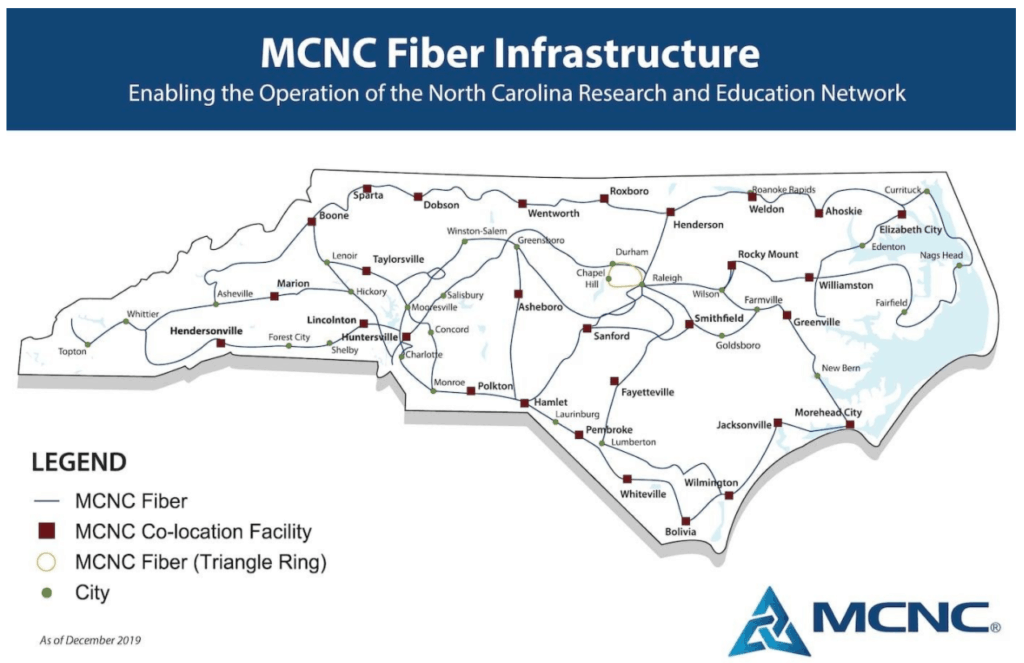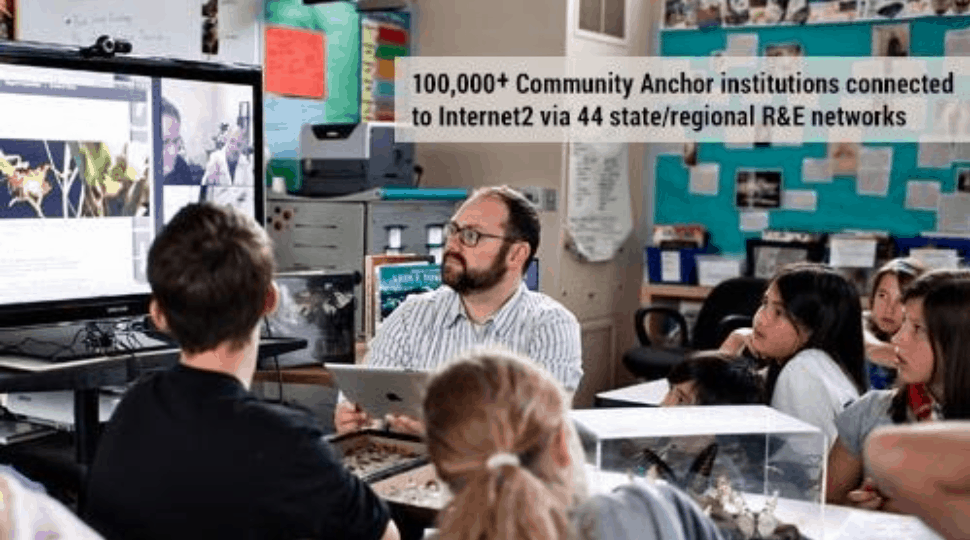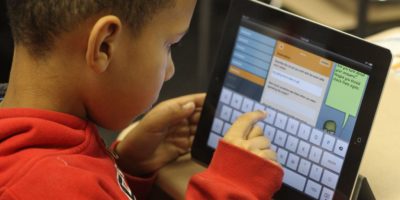Welcome to our monthly feature on EducationNC called the NC STEM ScoreCard, written in partnership with the N.C. Science, Mathematics, and Technology Education (SMT) Center and the Burroughs Wellcome Fund. The previous edition of the STEM ScoreCard featuring UNC-TV Public Media can be found here.
The goal of the NC STEM ScoreCard is to build broader awareness of how P-20 STEM* education is being nurtured across North Carolina and the impact on the well-being of our citizens and state. STEM here is an acronym for Strategies That Engage Minds.


Strategic investment in programs that support the quality and impact of STEM education in North Carolina is a central focus of the NC STEM ScoreCard. We focus again this month on an organization in North Carolina that provides critical infrastructure support for teaching and learning, and so much more, in the time of the COVID-19 pandemic: MCNC.
Advancing North Carolina
A nonprofit, client-focused technology organization founded in 1980, MCNC provides high-performance networking and technology solutions for education, research, libraries, health care, public safety, and other community anchor institutions (CAIs) throughout North Carolina.
The internet is important to everyone in the 21st century, and secure broadband access is one of the most vital investments we can make for North Carolina’s economic future. MCNC is much more than just a network operator; it provides innovative technology services and expertise to help organizations of all sizes.
MCNC owns and operates one of America’s longest-running regional research and education networks, the North Carolina Research and Education Network (NCREN). This is the fundamental broadband infrastructure for 850 CAIs including all K-12 education in North Carolina.
MCNC customizes internet services and related applications for each client while supporting private service providers in bringing cost-efficient connectivity to rural and underserved communities in North Carolina.
History
The North Carolina General Assembly initially funded the Microelectronics Center of North Carolina to be a catalyst for technology-based, economic development throughout the state.
In 1985, MCNC received a state mandate for providing and operating an advanced communications network called CONCERT (subsequently called NCREN), an initial microwave system that linked NC State University, UNC Chapel Hill, Duke University, NC A&T, UNC Charlotte, and the Research Triangle Institute.
This was the first broadcast-quality, two-way interactive, multipoint video and audio system in the United States. The mcnc.org domain was registered on the internet on January 15, 1987, and is No. 6 on the list of the oldest .org domains registered.
Since its inception, MCNC has continued to expand the NCREN backbone, supporting more than 4,000 miles of fiber-optic infrastructure to underserved and unserved communities in North Carolina.
Today, MCNC delivers modern internet on a world-class network that maintains 99.99% uptime and spans all 100 counties in North Carolina. In addition, MCNC provides a suite of technology services including connectivity, security, consulting, data center, and collaboration services.


MCNC and K-12 education in North Carolina
MCNC is the Internet Service Provider (ISP) for public K-12 education in North Carolina. All 115 local education agencies (LEAs) — and currently more than 80% of the state’s charter schools — are connected to NCREN. Interconnecting all public schools is an important outcome of the North Carolina School Connectivity Initiative (SCI).


MCNC and the NC School Connectivity Initiative
The SCI was established in 2007 to expand the number of schools with broadband internet access, further develop communication networks for rural and under-performing schools, aid in professional development for technology staff, and develop a scalable model to maintain and enhance network services to all schools in North Carolina.
It includes four primary programs:
- Maintain a governance structure and funding plan to manage the SCI and provide funding to support broadband internet access for LEAs and charter schools. In 2015, SCI funding was extended to include internal connections for schools, such as local area networks, wireless local area networks, and cabling.
- Maintain an E-Rate Filing Assistance Bureau to support LEAs and charter schools.
- Expand NCREN to connect to all 115 LEAs and participating charter schools.
- Maintain Client Network Engineering (CNE) Services — network consulting services for LEAs and charter schools.
These services are delivered through collaboration among MCNC, the N.C. Department of Public Instruction (NCDPI), the Friday Institute for Educational Innovation, and the N.C. Department of Information Technology. MCNC has lead responsibility for providing two of the four critical programs of the SCI: broadband connectivity services and CNE services.
The FCC established the Schools and Libraries Universal Support Mechanism, or E-Rate, to bring advanced services to schools and libraries across America. The program represents the federal government’s largest education technology program.
The 1996 Telecommunications Act directed U.S. telecommunications providers to contribute to the USF in the form of fees that would subsidize the deployment of broadband infrastructure to American schools and libraries through the E-Rate program.
There is proposed legislation in congress right now through the new Emergency Educational Connections Act that could allocate an additional $4 billion to ensure all K-12 students have access to “adequate” home broadband connectivity and devices during the COVID-19 pandemic. That legislation is currently pending.
Broadband is essential for success in higher education
There are more than 50 universities and colleges throughout North Carolina. Each continues to increasingly integrate broadband-dependent technologies in curriculum and administration, and access is required for students, faculty, and staff both on and off campus.
Implementation of new digital learning environments and dynamic online courses and degrees, as well as the advent of eSports on campus, is further proof that demand for middle-mile bandwidth in higher education will continue to rise. To accommodate this growth, MCNC offers internet connections ranging from 10 Mbps to 100 Gbps.
MCNC also provides critical technology and networking services for the North Carolina Community College System (NCCCS). North Carolina has the third largest community college system in the United States.
Since 2011, MCNC has partnered with NCCCS and the N.C. Department of Information Technology to integrate a full range of IP-based technologies into individual teaching and learning environments in all 58 community colleges.
Public libraries
MCNC is a provider of broadband, consulting, and technology services to North Carolina libraries and library systems. K-12 students and adult citizens rely on these trusted community anchor institutions for traditional services such as books, research, and other media borrowing as well as providing computers with internet access and places for learners to gather for information and activities.


All MCNC service offerings such as an internet connection to its backbone network, security, consulting, data center, training and events, and collaboration are available to libraries. Libraries also have access to Internet2 through their connection with MCNC, which includes access to national digital resources via the Internet2 Community Anchor Program.
Public safety
High-speed broadband is a critical and essential service for public safety providers throughout North Carolina. As part of MCNC’s statewide expansion enabled by grants from the Broadband Technology Opportunities Program (BTOP) and the Golden LEAF Rural Broadband Initiative (GLRBI), MCNC has been successful in connecting several public service locations to NCREN.
Among other public safety services, MCNC provides transport services for North Carolina’s public safety communications centers scattered throughout the state to connect to the VIPER (Voice Interoperability Plan for Emergency Responders) system, a statewide 800 MHz radio system supporting more than 124,000 users with interoperable communications among public safety agencies as they respond to calls or encounter unexpected emergencies and devastation.
Impacts
MCNC exists to benefit North Carolina by creating unprecedented opportunities to accelerate broadband-based economies. In this sense, MCNC’s network, NCREN, is much more than a network; it’s an interconnected community for North Carolina.
- 100% of K-12 public schools connected
- 100% of North Carolina Community Colleges connected
- 100% of the UNC System and General Administration connected
- 70% of N.C. Independent Colleges and Universities connected
- 4,000+ miles of fiber-optic infrastructure spanning all 100 counties
- All North Carolina LEAs have at least a 100 Mbps connection to NCREN
- More than 230 health care institutions are connected by MCNC through the North Carolina Telehealth Network Association (NCTNA)
- MCNC serves nearly 30 agricultural research and co-op institutions in the state
- NCREN connects to advanced research networks like Internet2
- Privacy and cybersecurity are top priorities for MCNC, offering client protections through a constantly-evolving portfolio of services
- MCNC offers a range of hosting options in an advanced SOC 2 compliant data center
- MCNC Network Operations Center monitors more than 850 constituent endpoints and is staffed 24x7x365.
Beyond connectivity
There are multiple organizations and initiatives MCNC has supported and continues to support that goes beyond just establishing high-speed connectivity in North Carolina. MCNC fosters a community of collaboration by supporting programs like the N.C. Business Committee for Education’s Students@Work and Teachers@Work.
MCNC supports the Certified Educational Chief Technology Officer (CeCTO) program through the UNC School of Government and periodically offers summer internships as well as training and professional development opportunities such as the Summer Institutes.
One of the more significant developments supported by MCNC was the creation of NC STEM in 2008. Initially dubbed the North Carolina (NC) STEM Community Collaborative, now referred to as the NC STEM Learning Network, is a program of support for communities whose economic vitality is dependent on a workforce with science, technology, engineering, and mathematics (STEM) skills.
Through NC STEM, MCNC was able to facilitate and broker local support to these “STEM Communities,” helping local government, business and education leaders meet their STEM education and workforce needs. In addition to MCNC resources, a $475,000 grant from the Bill & Melinda Gates Foundation provided initial funding for NC STEM, which is now organizationally structured under the North Carolina SMT Center.
Final thoughts
As the owner and operator of NCREN, MCNC provides high-speed internet and value-added services so a student anywhere in North Carolina can be online while at school or at a library, so researchers and health care professionals can find that next great innovation or medical discovery, so citizens and local economies can thrive with an educated and connected workforce, and so public safety agencies can keep us all safe.
All of this is done in a secure, cost-conscious manner while delivering a breakthrough client experience using the best technologies available today. MCNC also shares its broadband infrastructure with private-sector companies.
This neutral, open access delivery model helps bring enhanced, affordable and reliable broadband connectivity to consumers and businesses in areas of North Carolina previously unreachable. By successfully developing public/private partnerships to support those growth markets for small/rural service providers, consumers continue to see lower costs and better services.
MCNC’s 4,000-mile network and the expertise running it every day serve as a strong foundation for collaboration in research, education, health care and public safety throughout the state, and MCNC remains committed to Connecting North Carolina’s Future Today.
Questions for maximizing MCNC’s strategic investments to enhance STEM education in North Carolina
- How can the public and policymakers be helped to better understand and support MCNC, given its value for schools, colleges and universities, libraries, other essential public services, and the North Carolina business community?
- Although massive progress has been made over the past decade, how can North Carolina better leverage MCNC to close the digital divide and the homework gap throughout the state?
- What value-added technology services offered by MCNC make the most sense for school districts?
- What other bottlenecks exist to ensure North Carolina schools, especially in rural areas, enjoy great connectivity?
- How can we better prevent the “homework gap” from becoming a larger “learning gap” during the coronavirus pandemic?
Special thanks to MCNC for assistance in compiling this edition of the NC STEM ScoreCard
Send questions and comments on the NC STEM ScoreCard to coble@tpanalytics.com





